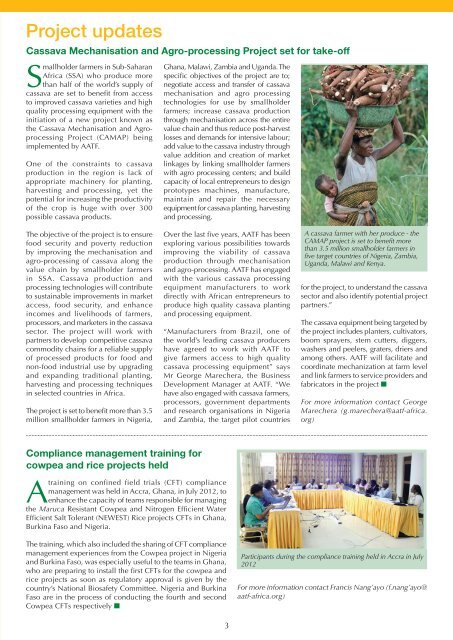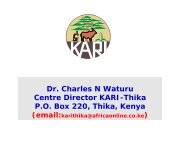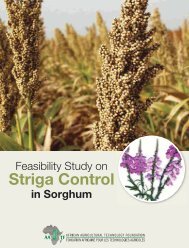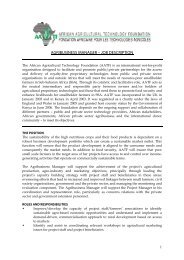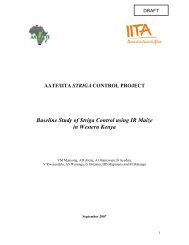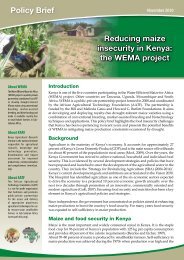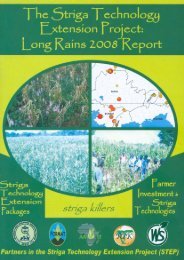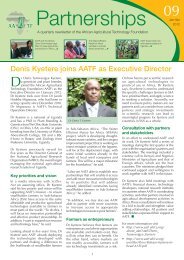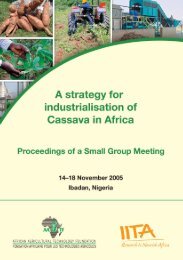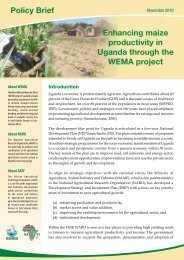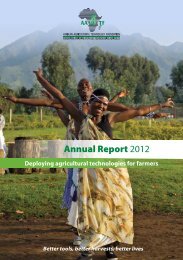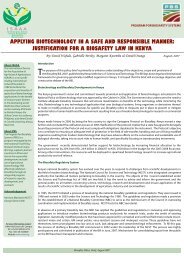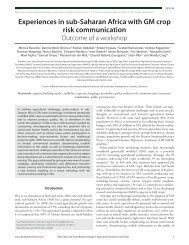Partnerships Issue 10 - African Agricultural Technology Foundation
Partnerships Issue 10 - African Agricultural Technology Foundation
Partnerships Issue 10 - African Agricultural Technology Foundation
Create successful ePaper yourself
Turn your PDF publications into a flip-book with our unique Google optimized e-Paper software.
Project updates<br />
Cassava Mechanisation and Agro-processing Project set for take-off<br />
Smallholder farmers in Sub-Saharan<br />
Africa (SSA) who produce more<br />
than half of the world’s supply of<br />
cassava are set to benefit from access<br />
to improved cassava varieties and high<br />
quality processing equipment with the<br />
initiation of a new project known as<br />
the Cassava Mechanisation and Agroprocessing<br />
Project (CAMAP) being<br />
implemented by AATF.<br />
One of the constraints to cassava<br />
production in the region is lack of<br />
appropriate machinery for planting,<br />
harvesting and processing, yet the<br />
potential for increasing the productivity<br />
of the crop is huge with over 300<br />
possible cassava products.<br />
The objective of the project is to ensure<br />
food security and poverty reduction<br />
by improving the mechanisation and<br />
agro-processing of cassava along the<br />
value chain by smallholder farmers<br />
in SSA. Cassava production and<br />
processing technologies will contribute<br />
to sustainable improvements in market<br />
access, food security, and enhance<br />
incomes and livelihoods of farmers,<br />
processors, and marketers in the cassava<br />
sector. The project will work with<br />
partners to develop competitive cassava<br />
commodity chains for a reliable supply<br />
of processed products for food and<br />
non-food industrial use by upgrading<br />
and expanding traditional planting,<br />
harvesting and processing techniques<br />
in selected countries in Africa.<br />
The project is set to benefit more than 3.5<br />
million smallholder farmers in Nigeria,<br />
Ghana, Malawi, Zambia and Uganda. The<br />
specific objectives of the project are to;<br />
negotiate access and transfer of cassava<br />
mechanisation and agro processing<br />
technologies for use by smallholder<br />
farmers; increase cassava production<br />
through mechanisation across the entire<br />
value chain and thus reduce post-harvest<br />
losses and demands for intensive labour;<br />
add value to the cassava industry through<br />
value addition and creation of market<br />
linkages by linking smallholder farmers<br />
with agro processing centers; and build<br />
capacity of local entrepreneurs to design<br />
prototypes machines, manufacture,<br />
maintain and repair the necessary<br />
equipment for cassava planting, harvesting<br />
and processing.<br />
Over the last five years, AATF has been<br />
exploring various possibilities towards<br />
improving the viability of cassava<br />
production through mechanisation<br />
and agro-processing. AATF has engaged<br />
with the various cassava processing<br />
equipment manufacturers to work<br />
directly with <strong>African</strong> entrepreneurs to<br />
produce high quality cassava planting<br />
and processing equipment.<br />
“Manufacturers from Brazil, one of<br />
the world’s leading cassava producers<br />
have agreed to work with AATF to<br />
give farmers access to high quality<br />
cassava processing equipment” says<br />
Mr George Marechera, the Business<br />
Development Manager at AATF. “We<br />
have also engaged with cassava farmers,<br />
processors, government departments<br />
and research organisations in Nigeria<br />
and Zambia, the target pilot countries<br />
A cassava farmer with her produce - the<br />
CAMAP project is set to benefit more<br />
than 3.5 million smallholder farmers in<br />
five target countries of Nigeria, Zambia,<br />
Uganda, Malawi and Kenya.<br />
for the project, to understand the cassava<br />
sector and also identify potential project<br />
partners.”<br />
The cassava equipment being targeted by<br />
the project includes planters, cultivators,<br />
boom sprayers, stem cutters, diggers,<br />
washers and peelers, graters, driers and<br />
among others. AATF will facilitate and<br />
coordinate mechanization at farm level<br />
and link farmers to service providers and<br />
fabricators in the project n<br />
For more information contact George<br />
Marechera (g.marechera@aatf-africa.<br />
org)<br />
Compliance management training for<br />
cowpea and rice projects held<br />
A<br />
training on confined field trials (CFT) compliance<br />
management was held in Accra, Ghana, in July 2012, to<br />
enhance the capacity of teams responsible for managing<br />
the Maruca Resistant Cowpea and Nitrogen Efficient Water<br />
Efficient Salt Tolerant (NEWEST) Rice projects CFTs in Ghana,<br />
Burkina Faso and Nigeria.<br />
The training, which also included the sharing of CFT compliance<br />
management experiences from the Cowpea project in Nigeria<br />
and Burkina Faso, was especially useful to the teams in Ghana,<br />
who are preparing to install the first CFTs for the cowpea and<br />
rice projects as soon as regulatory approval is given by the<br />
country’s National Biosafety Committee. Nigeria and Burkina<br />
Faso are in the process of conducting the fourth and second<br />
Cowpea CFTs respectively n<br />
Participants during the compliance training held in Accra in July<br />
2012<br />
For more information contact Francis Nang’ayo (f.nang’ayo@<br />
aatf-africa.org)<br />
3


